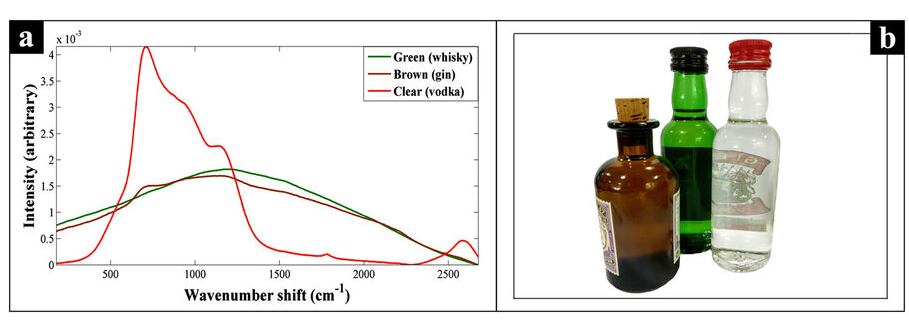It was able to find the six most common denaturants and four flavourings/additives used in fake spirits drinks such counterfeit whisky.
SORS works by using an optical approach where lasers are directed through the glass enabling the isolation of chemically-rich information held within the spirits.
Researchers demonstrated detection through multiple colours of bottles and in a variety of spirits. The laser has to be pointed at the bottle for a minute but this could get quicker in the future.
They also discriminated between different types of spirit drinks and detected methanol at 0.025% which is lower than the maximum tolerable concentration for humans of 2% in a 40% spirit drink.
The 10 denaturants/additives
Denaturants: methanol, isopropyl alcohol, methyl isopropyl ketone, methyl ethyl ketone, ethyl sec-amyl ketone and denatonium benzoate
Flavourings: vanillin, limonene, sucrose and trans anethole
Professor Roy Goodacre, from the university’s School of Chemistry in the Manchester Institute of Biotechnology (MIB) and Dr David Ellis, who co-authored the project, said photonic/optical-based methods could easily cope with ‘real world’ scenarios as they are rapid, mobile, robust and Raman devices don’t suffer from interference by water.
“We would of course like to be able to develop this further, using our in-house algorithms and expertise, along with the knowledge and expertise of our collaborators on this project from Cobalt Light Systems and the Scotch Whisky Research Institute (SWRI),” they said.
“Discussions are ongoing within the team who made this study possible. There is certainly more work in the research pipeline, in what is a very important area, with food security and food fraud and counterfeiting being an issue concerning everyone.”
Instead of lab-based techniques
A variety of lab-based techniques have been used to authenticate spirit drinks but they require transportation of the samples to be analysed, are destructive and provide retrospective results.
“We do not have to open containers/bottles to achieve these goals, whereas currently bottles do have to be opened to take samples, with those techniques able to look detect through bottles mainly detecting different concentrations of alcohol, or telling one brand of type of drink from another,” said Goodacre and Ellis.
Goodacre said it had multiple control samples of genuine spirit drinks.
“Once we have these, via the use of the SORS device and in-house algorithms here in the University of Manchester, we can see the variation from the ‘spectral fingerprints’ of the genuine products and those that mimicked real world counterfeits.”
The team looked at multiple samples of the same batches to build up a fingerprint of genuine samples.
“We could then spot this variation from the norm with the samples from different types of chemical markers of counterfeits clustering together. With methanol for example we could see how this also changed with decreasing concentration of this compound, so we were absolutely sure what we were looking at was real,” said Goodacre.
“So if we can achieve this with a variety of types of spirits drinks, through multiple colours of glass bottles, then there should be no reason why we couldn’t achieve the same with wines.”

Cobalt Light Systems developed the Resolve handheld SORS device for explosives and hazmat detection and pharma analysis.
They also make the benchtop Transmission Raman spectroscopy (TRS) devices and the team took an opportunity to compare them with samples from the SWRI in Edinburgh.
The Resolve is a handheld SORS unit but the TRS can run multiple samples (~30) quickly in a tray system.
Counterfeit and illicit spirit drinks
In the spirit drinks sector, counterfeiters often ‘recycle’ used genuine packaging or employ good quality simulants.
Researchers demonstrated it is possible to detect 10 denaturants/additives in low concentrations without any contact with the sample; discriminate between and within Scotch whisky brands and detect methanol concentrations below the maximum human tolerable level.
They tested around 150 brands of Scotch Whisky, rum, gin and vodka in closed glass containers, including 40 counterfeit products.
The team also tested several bottles of spirit drinks bought from local shops.
These were first measured unopened, then opened and contaminated with different levels of methanol (1, 2 and 3%) and the tops replaced.
The handheld SORS detected the contamination with methanol through multiple colours (clear/brown/green) of glass bottles in several types of spirit drinks including Scotch Whisky, gin and vodka.
Sales of illicit spirit drinks have economic and possibly health consequences.
Counterfeit goods do not follow the same health and safety procedures brands are forced to comply with by EU law. Counterfeit spirits often contain dangerous levels of methanol, a chemical used in antifreeze, which can cause sore throats, dizziness, sickness and blindness.
Dr Ellis said: “Sales of illicit spirit drinks can also have serious health impacts when industrial alcohols or methanol are used by counterfeiters and unknowingly consumed, with multiple deaths reported worldwide each year. That is why we have developed this approach, not only to ensure brand authenticity, but also to safeguard public health.”
Source: Scientific Reports 7, Article number: 12082 (2017)
Article DOI: 10.1038/s41598-017-12263-0
“Through-container, extremely low concentration detection of multiple chemical markers of counterfeit alcohol using a handheld SORS device”
Authors: David I. Ellis, Rebecca Eccles, Yun Xu, Julia Griffen, Howbeer Muhamadali, Pavel Matousek, Ian Goodall and Royston Goodacre
